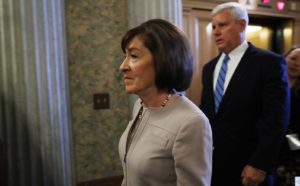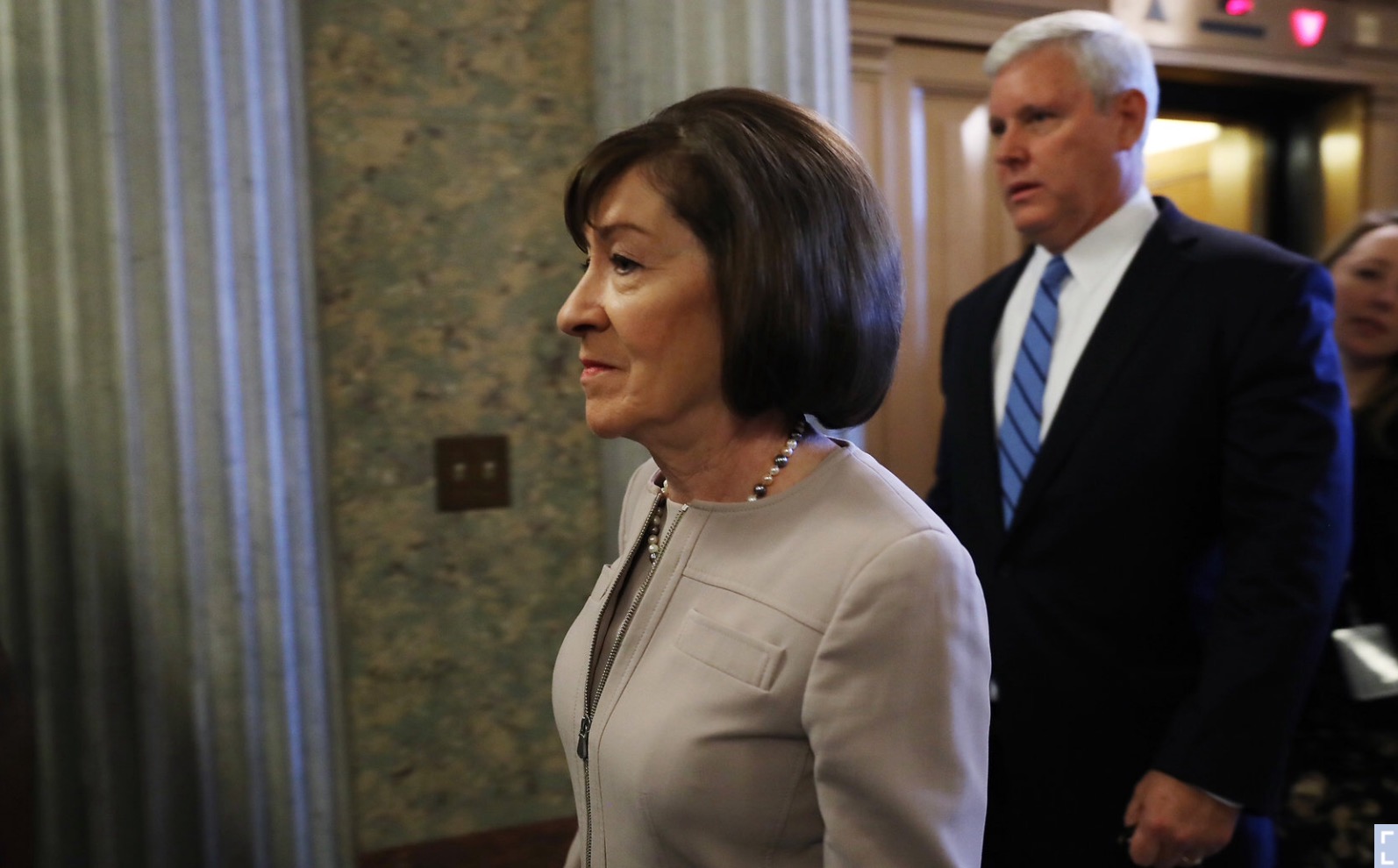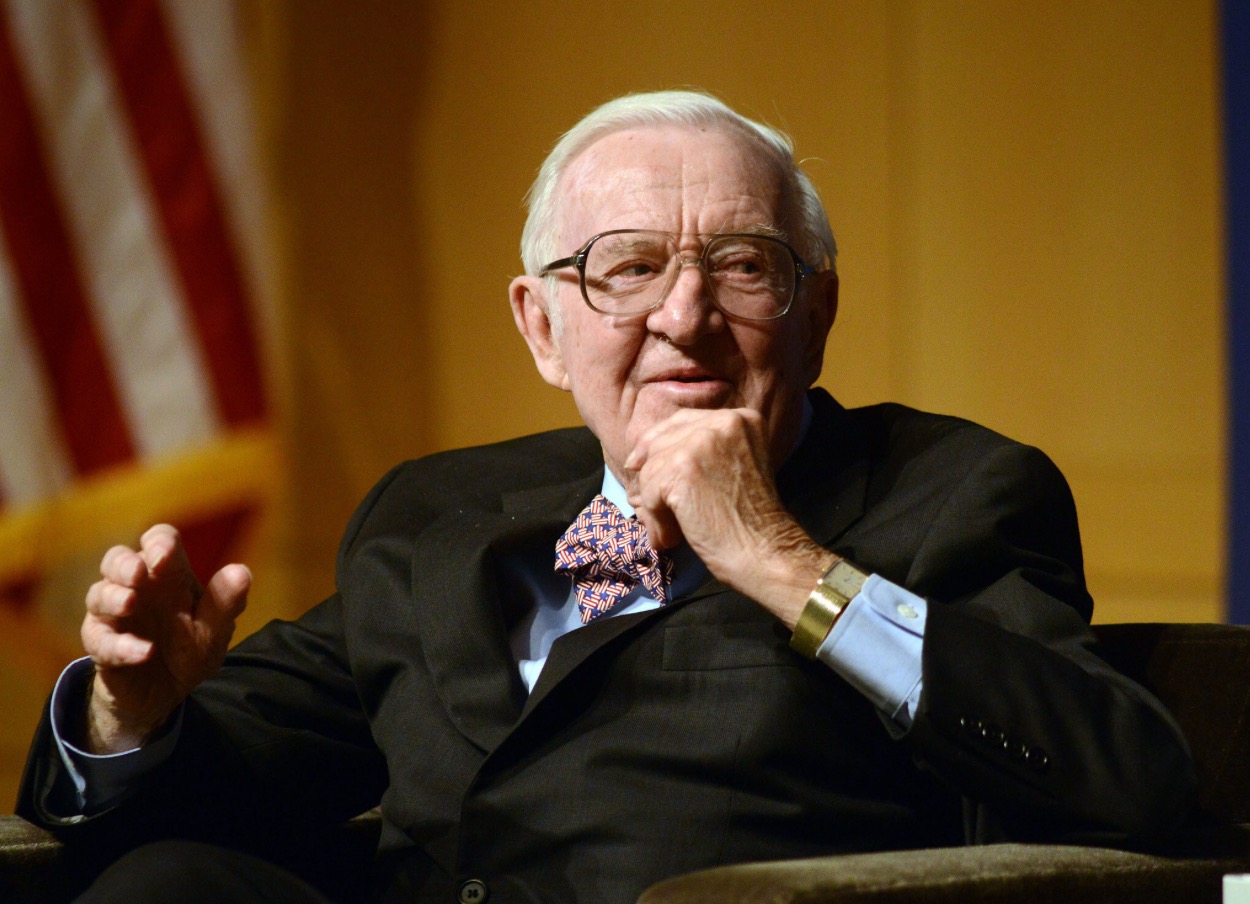Tag: Brett Kavanagh
Kavanaugh Passes Critical Senate Hurdle

Sen. Susan Collins, R-Maine, arrives on Capitol Hill on Friday. Collins voted to advance Brett Kavanaugh’s nomination, but says she will announce her position for the final vote Friday afternoon.
Updated at 11:48 a.m. ET
Brett Kavanaugh’s nomination to the Supreme Court cleared a key procedural hurdle in the Senate on Friday, 51-49. A final vote on his confirmation is expected as soon as Saturday. President Trump tweeted that he was “very proud” of the Senate for taking the critical step.
One Democrat, Sen. Joe Manchin of West Virginia, voted with Republicans to end debate and move the nomination forward. One Republican, Sen. Lisa Murkowski of Alaska, voted with Democrats against ending debate.
Still, the fate of Kavanaugh’s nomination remains unclear. Sen. Susan Collins, R-Maine, voted to end debate, but said she will announce her final position on whether to confirm Kavanaugh on Friday afternoon. Other senators could switch their votes as well.
In a speech leading up to the vote, Judiciary Committee Chairman Sen. Chuck Grassley, R-Iowa, said “the resistance is located right here on Capitol Hill,'” and he urged his colleagues to “say no to mob rule” by voting to confirm Kavanaugh.
The top Democrat on the panel, Sen. Dianne Feinstein of California, said Republicans have “largely chosen to ignore the testimony” of Christine Blasey Ford, who accused Kavanaugh of sexually assaulting her when they were teenagers.
President Trump, in a tweet Friday morning, criticized what he termed “the very rude elevator screamers,” who he said are “paid professionals only looking to make Senators look bad!” Without evidence, he alleged that the protesters, several of whom said they have been sexual assault victims, were “paid by [financier George] Soros and others.”
The very rude elevator screamers are paid professionals only looking to make Senators look bad. Don’t fall for it! Also, look at all of the professionally made identical signs. Paid for by Soros and others. These are not signs made in the basement from love! #Troublemakers
— Donald J. Trump (@realDonaldTrump) October 5, 2018
Senators had one day to review a confidential supplemental background check into Kavanaugh’s behavior in the early- to mid-1980s when he was in high school and college. The closely guarded collection of interviews is celebrated by Republican leaders as concrete proof that Kavanaugh did not harass or abuse women. Democrats say the interviews, which they originally requested, are incomplete and inconclusive.
“What we know for sure is the FBI report did not corroborate any of the allegations against Judge Kavanaugh,” McConnell said. “The second thing we know for sure is that there’s no way anything we did would satisfy the Democrats.”
Kavanaugh took an unusual step to boost his nomination Thursday evening, writing an op-ed in The Wall Street Journal expressing regret for the heated tone of his testimony before the Senate Judiciary Committee last week, including comments decrying Democratic attacks, that was seen by some wavering senators as too partisan.
“I was very emotional last Thursday, more so than I have ever been. I might have been too emotional at times. I know that my tone was sharp, and I said a few things I should not have said,” Kavanaugh wrote.
The White House defended Kavanaugh’s demeanor during the hearings.
“Any human being who has been falsely accused of a range of things including gang rape has a right to be upset, has a right to be angry, and that’s what we saw last week,” said White House spokesperson Kerri Kupec during an interview with Morning Edition.
McConnell received the 51 votes needed to clear the procedural hurdle on Friday. Republicans have enough votes to assure Kavanaugh’s nomination on their own, but only if they win the support of Collins as well as Murkowski, R-Alaska; and Jeff Flake, R-Ariz., who withheld judgment while the FBI completed its work.
All three spent hours in a secure room in the basement of the Capitol on Thursday reviewing the roughly 45 pages of FBI interviews. Collins and Flake both say the investigation was thorough, but neither would say whether they are now prepared to vote to confirm Kavanaugh.
Flake forced Republicans to launch the additional investigation last week after a tense negotiation with Senate Judiciary Committee Democrats. Flake spent a large portion of the afternoon reviewing the FBI work and said he saw no new evidence to corroborate any of the claims against Kavanaugh, which Flake had previously indicated would mean he will vote to confirm.
Democrats saw something very different in the report. Several criticized Republicans for limiting the FBI investigation to just nine interviews. They said the process ignored many potential witnesses, including Ford.
The FBI also apparently did not interview Kavanaugh.
Senate Minority Leader Chuck Schumer, D-N.Y., said those issues raised serious doubts about Kavanaugh and his qualifications.
“Judge Kavanaugh stated at his hearing that the individuals at the incident involving Dr. Ford refuted her version of events,” Schumer said Thursday. “From their own public statements, we knew that to be false, and nothing in this report changes that.”
Similar concerns moved Sen. Heidi Heitkamp, D-N.D., to announce Thursday that she would oppose Kavanaugh. Heitkamp is one of the most vulnerable Democrats on the ballot in November and has seen her poll numbers slip in recent weeks. She’s running for re-election in a state president Trump won in 2016 by more than 35 points.
Heitkamp said she was troubled by Kavanaugh’s aggressive appearance before the Senate Judiciary Committee and the message his confirmation would send to women and girls across the country.
Kavanaugh Nomination Battle Is Fought With Millions In Secret Cash
“When considering a lifetime appointment to Supreme Court, we must evaluate the totality of the circumstances and record before us,” Heitkamp said in a statement. “In addition to the concerns about his past conduct, last Thursday’s hearing called into question Judge Kavanaugh’s current temperament, honesty, and impartiality.”
Her opposition leaves Manchin, as the only publicly undecided Democrat on final passage. He is also in a tough re-election campaign and was silent on Kavanaugh in the days leading up to the vote.
The nomination now hangs on the decisions of Collins, Murkowski, Flake and Manchin.
READ MORE NPR NEWS
Retired Justice John Paul Stevens Says Kavanaugh Is Not Fit for Supreme Court
WASHINGTON — In an unusual rebuke from a former member of the Supreme Court, Justice John Paul Stevens said on Thursday that Judge Brett M. Kavanaugh was not qualified to sit on the court.
Justice Stevens said he came to the conclusion reluctantly, changing his mind about Judge Kavanaugh’s nomination after the second round of the judge’s confirmation hearings last week. Judge Kavanaugh’s statements at those hearings, Justice Stevens said, revealed prejudices that would make it impossible for him to do the court’s work, a point he said had been made by prominent commentators.
“They suggest that he has demonstrated a potential bias involving enough potential litigants before the court that he would not be able to perform his full responsibilities,” Justice Stevens said in remarks to retirees in Boca Raton, Fla. “And I think there is merit in that criticism and that the senators should really pay attention to it.”
“For the good of the court,” he said, “it’s not healthy to get a new justice that can only do a part-time job.”
At the hearing last week, Judge Kavanaugh used starkly partisan language to describe the accusations against him.
“This whole two-week effort has been a calculated and orchestrated political hit,” he said, “fueled with apparent pent-up anger about President Trump and the 2016 election, fear that has been unfairly stoked about my judicial record, revenge on behalf of the Clintons and millions of dollars in money from outside left-wing opposition groups.”
You have 4 free articles remaining.
Subscribe to The Times
Justice Stevens is 98, and he retired from the Supreme Court in 2010. He was appointed in 1975 by President Gerald R. Ford, a Republican, but he voted with the court’s liberal wing for much of his tenure.
Justice Stevens said he had admired Judge Kavanaugh’s judicial work and had written positively about it in one of his books, “Six Amendments,” which proposed a number of changes to the Constitution. One concerned the Citizens United campaign finance case, in which Justice Stevens had dissented.
In the book, Justice Stevens praised a decision from Judge Kavanaugh. Writing for a three-judge panel of the Federal District Court in Washington, Judge Kavanaugh ruled two foreign citizens living in the United States on temporary work visas could not spend money to call for the election of American politicians.
Justice Stevens said he thought that decision was sound. “As a matter of fact, I put his picture in the book to illustrate my admiration for it,” Justice Stevens said. “At that time, I thought he had definitely the qualifications to sit on the Supreme Court and should be confirmed if he was ever selected.”
“I’ve changed my views for reasons that have really no relationship to his intellectual ability or his record as a federal judge,” Justice Stevens said. “He’s a fine federal judge, and he should have been confirmed when he was nominated.”
“But I think that his performance during the hearings caused me to change my mind,” Justice Stevens said, noting that prominent law professors, including Laurence H. Tribe, a law professor at Harvard, were also critical of Judge Kavanaugh’s statements.
Justice Stevens rejected comparisons to the experience of Justice Clarence Thomas, who endured a bruising confirmation hearing in 1991 after being accused of sexual harassment. “There’s nothing that Clarence did in the hearings that disqualified him from sitting in cases after he came on the court,” Justice Stevens said.
Justice Stevens said he disagreed with Justice Thomas in most important cases but found him to be “a decent and likable person.”
“You cannot help but like Clarence Thomas,” Justice Stevens said, “which I don’t think necessarily would be true of this particular nominee.”



